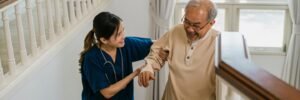
Stroke Emergency Help: Brain Stroke Symptoms in Elderly
Learn early brain stroke symptoms in elderly people and what to do immediately. Fast action saves lives. Call Care247 at 1800 2021 247 for stroke emergency help.

We are getting old but so are our parents and elders around us. About 11.1% population in India is aged 60 years and older. Older adults undergo a lot of changes in their body due to aging which can lead to numerous health issues like diabetes, hypertension, heart problems, etc. Aging also hints towards the body’s increasing demand for maintaining optimal nutrition, strength training, exercises, and regular checkups that mainly focus on cardiac activities, signs of frailty, and deficiencies.
In this busy life we need to remind ourselves that our parents and loved ones need to be taken care of and to be looked after. We can start with small steps like checking in on their diet, daily routine, scheduling regular health checkups, medication compliance, and even helping them to make their daily routine and chores easier.
1. Ask about history of falling — perform a stand up and go test (get up from a chair, walk 3 meters, turn, walk back, and sit down). If it takes more than 13 seconds, fall risk is high.
2. Ask if they experience urine leaks or wetness for more than 6 separate days — this checks muscle control and health issues.
3. Ask if they lost more than 4.5 kg in 6 months — check weight monthly for nutritional deficits.
4. Show them 3 items and ask them to recall after 1–10 minutes — to check forgetfulness.
5. Observe any decline in interest in activities they used to enjoy, feelings of sadness or loneliness — this can indicate depression.
Common conditions that can hinder normal activities in older age include: hearing loss, cataracts, diabetes, depression, dementia, back and neck pain, and refractive errors.
Multiple underlying factors include frailty, urinary incontinence, falls, delirium, and pressure ulcers.

Learn early brain stroke symptoms in elderly people and what to do immediately. Fast action saves lives. Call Care247 at 1800 2021 247 for stroke emergency help.

Worried about your parents’ health in India while living abroad? This NRI guide answers emergency care, home care, hospital, and elderly support concerns.

Know the real duties of a senior citizen care taker, what they do, what they don’t, and how Care247 supports elders at home. Call 1800 2021 247 to book.